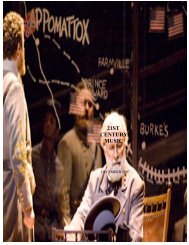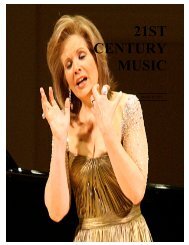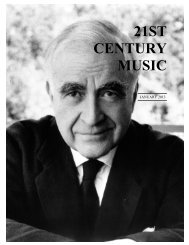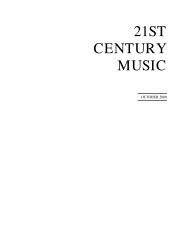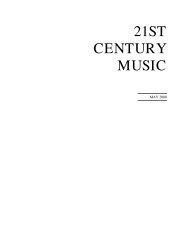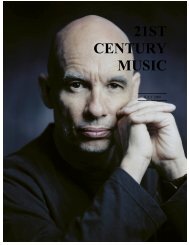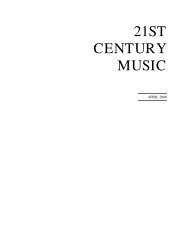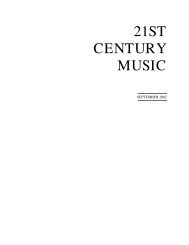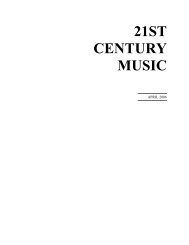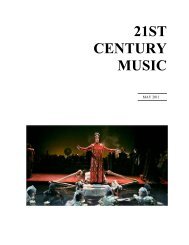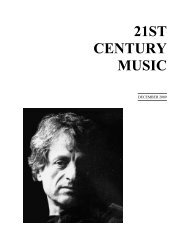You also want an ePaper? Increase the reach of your titles
YUMPU automatically turns print PDFs into web optimized ePapers that Google loves.
LANG: And that's why I was drawn to the music of<br />
Andriessen, because I thought that this was music that has the<br />
simple, unornamented rhythmic simplicity of the minimalists,<br />
but it hadn't jettisoned the dissonant language from Europe.<br />
And I thought, "That's interesting. That's my alley."<br />
ALBURGER: So that became a door for you.<br />
LANG: Right.<br />
ALBURGER: Were there any particular pieces that at some<br />
point you encountered and said, "Oh!" -- that were important<br />
to you on the minimalist side Do you recall any particular<br />
first hearings Or have you just sort of grown into this music<br />
naturally<br />
LANG: I've just sort of grown into the music. I heard [Steve<br />
Reich's] Drumming. I heard [his] <strong>Music</strong> for Mallet<br />
Instruments [Voices, and Organ] in 1974. I heard the Philip<br />
Glass Ensemble play in 1974.<br />
ALBURGER: Were they playing <strong>Music</strong> in 12 Parts<br />
LANG: They played Another Look at Harmony.<br />
ALBURGER: That pre-Einstein piece.<br />
LANG: Pre-Einstein. Proto-Einstein.<br />
ALBURGER: Right. Harmony kind of grew into Einstein.<br />
LANG: I wouldn't say that those pieces were revolutionary<br />
for me, because I really think that I was thinking about such<br />
things also.<br />
ALBURGER: More evolutionary than revolutionary.<br />
LANG: Already by the time I got out of high school, I was<br />
really aware of such music. The only piece I remember really<br />
changing my world was when I was 15; I went to a<br />
performance of Lilacs by Carl Ruggles. I went to every<br />
contemporary music thing in Los Angeles that I could find.<br />
ALBURGER: The Monday Evening Concerts<br />
LANG: Just about all of them, and every single thing I could<br />
go to. Before I could drive, I'd drag my parents to them.<br />
Whatever I could do. So, I heard a performance by some local<br />
orchestra of Lilacs. I thought, "O.K., well, here's a composer<br />
I've read about, but I've never heard his music. I don't know<br />
anything about this, but I have a pretty good idea of what an<br />
orchestral piece called Lilacs is going to sound like. It's going<br />
to sound really beautiful. It's going to sound [sing-song voice]<br />
like flowers."<br />
ALBURGER: The informing word was "Ruggles" not<br />
"lilacs."<br />
LANG: Well, I got there and I was so shocked! I still<br />
remember the shock. I just remember going, "This is the<br />
ugliest thing I've ever heard, there must be something here!"<br />
11<br />
ALBURGER: Ah, yes. That's a healthy open mind, too.<br />
"There's a problem, but I have to investigate this more," rather<br />
than, "There's a problem, fuggetaboutit."<br />
LANG: Well, that's right, yes. But also "It's a problem,"<br />
means that the experience that I thought was going to be easy<br />
turned out to be difficult, and that was interesting to me. And<br />
I think that may have been my first brush with that concept<br />
which has become so important to me: of having silly pieces<br />
that turn out to be very serious. The idea of getting something<br />
that you weren't looking for -- I think it really came from that.<br />
I really do remember that as being a very important experience<br />
for me.<br />
ALBURGER: Bang on a Can has been going on for a number<br />
of years. And the Bang on a Can All-Stars would have come<br />
out of that a couple of years later Did they start as the house<br />
band for the Marathon<br />
LANG: The Marathon always used different kinds of<br />
ensembles and soloists. We had the ROVA Saxophone<br />
Quartet from the Bay Area; we had the California E.A.R. Unit<br />
from Los Angeles. After a while we realized that we were<br />
booking the same soloists over and over again. We would<br />
have Steve Schick from San Diego, or Robert Black from<br />
Hartford, or Evan Ziporyn from Boston. We were depending<br />
on these people that were really important to us. And we had<br />
this idea that maybe it might be interesting to see what it<br />
would be like if these soloists played together.<br />
ALBURGER: Hence the All-Stars.<br />
LANG: And that's how the All-Stars started. It was these<br />
people who never really would have found each other without<br />
this. And people who had dedicated their lives to not playing<br />
in ensembles. It's an interesting kind of tension for them.<br />
ALBURGER: Because they don't have that natural cohesion<br />
of a group that has been playing together for years.<br />
LANG: Their goal is actually to do lots of other things. In<br />
fact, in circumstances where it has been possible that a<br />
conductor might be necessary, someone in the band always<br />
says, at one point or another, "You know, if I had wanted to<br />
play with a conductor, I'd be playing in an orchestra."<br />
ALBURGER: So that has never washed with the group.<br />
LANG: It's not something that makes them happy.<br />
ALBURGER: Yes. Has a conductor been utilized<br />
occasionally<br />
LANG: A little bit. But also, what's really good is, when they<br />
need a conductor, they can do it themselves. Someone from<br />
the group figures out a way to play their part and conduct. A<br />
lot of times, what's interesting is that in really complicated<br />
pieces that role changes from person to person. So you really<br />
see how the control moves around, which is fine.



